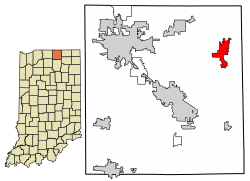Middlebury, Indiana | |
|---|---|
 Middlebury's water tower in 2005. | |
 Location of Middlebury in Elkhart County, Indiana. | |
| Coordinates: 41°40′10″N85°42′29″W / 41.66944°N 85.70806°W | |
| Country | United States |
| State | Indiana |
| County | Elkhart |
| Township | Middlebury |
| Area | |
• Total | 4.35 sq mi (11.27 km2) |
| • Land | 4.33 sq mi (11.22 km2) |
| • Water | 0.02 sq mi (0.04 km2) |
| Elevation | 876 ft (267 m) |
| Population (2020) | |
• Total | 3,466 |
| • Density | 799.91/sq mi (308.87/km2) |
| Time zone | UTC-5 (Eastern (EST)) |
| • Summer (DST) | UTC-4 (EDT) |
| ZIP code | 46540 |
| Area code | 574 |
| FIPS code | 18-48924 [3] |
| GNIS feature ID | 2396758 [2] |
| Website | www |
Middlebury is a town in Middlebury Township, Elkhart County, Indiana, United States. It is located approximately 35 miles east of South Bend, 130 miles east of Chicago, Illinois, and 165 miles north of Indianapolis. Middlebury is nestled in Northern Indiana's Amish country. As of the 2010 census, the town population was 3,420.

